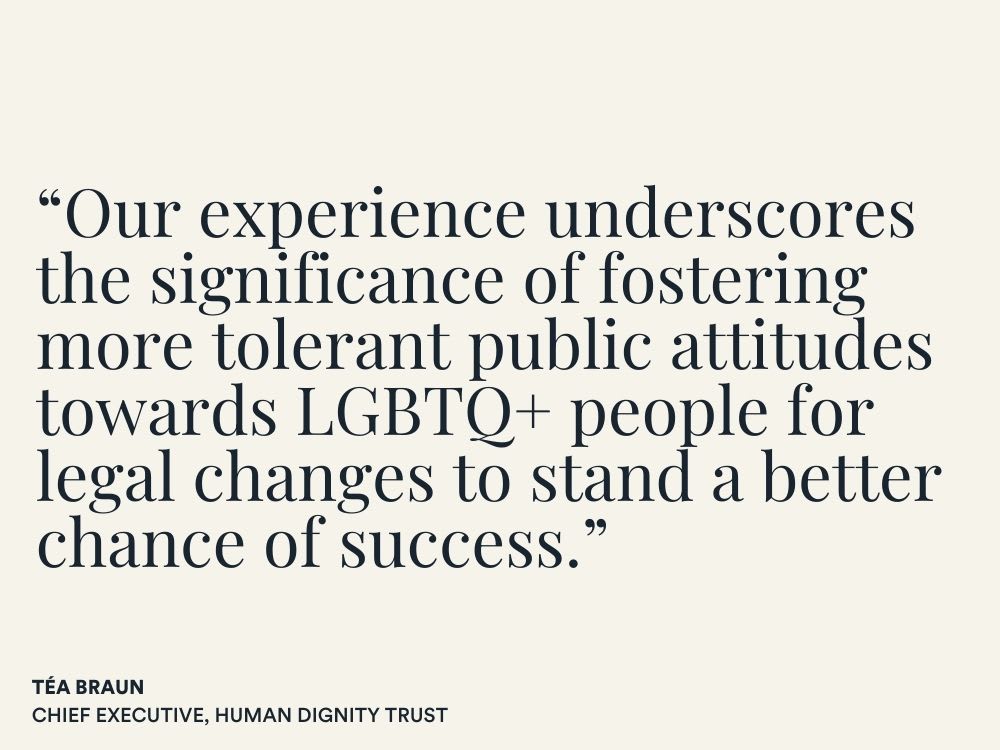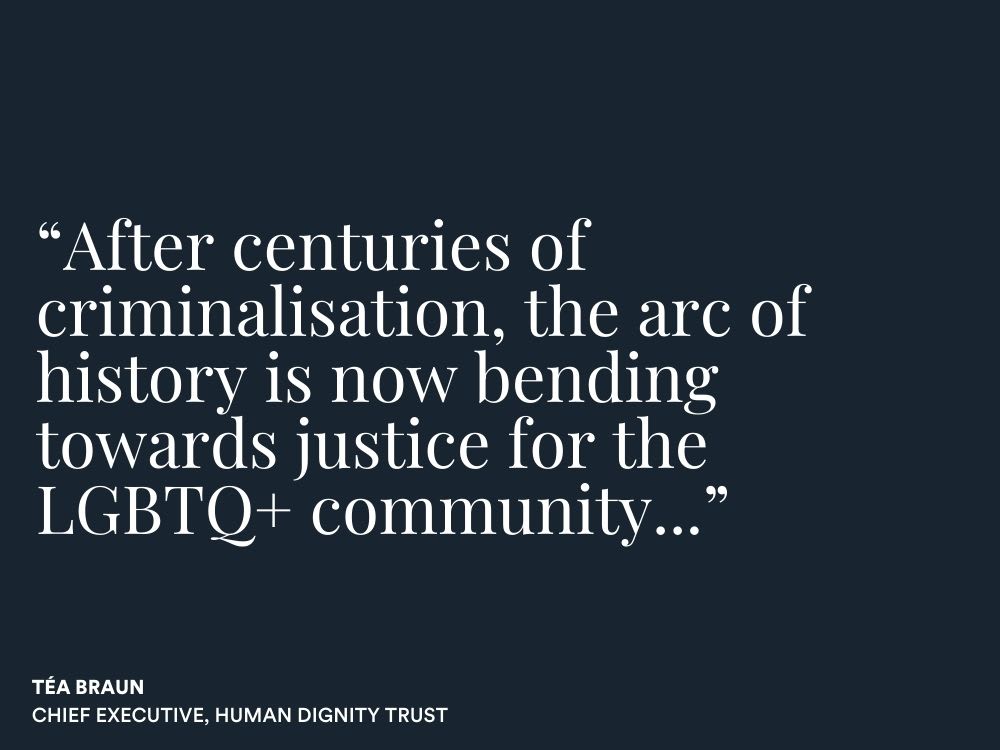Innovations in travel often move as speedily as a Boeing approaching take-off, but deep and meaningful changes that open up the world to travellers of all orientations can take a little longer to achieve, which is why organisations deeply committed to moving these along are so important.
After we spoke with the Human Dignity Trust last year about its deeply important work for travel equality for the LGBTQ+ community, we wanted to check in and see which way the needle was swinging, talking big strides in decriminalisation and positive representation – plus some travel advice – with chief executive Téa Braun.

First of all, we were very happy to see that the number of countries that criminalise LGBTQ+ people has fallen yet again from 2023 to 2024 – can you talk us through recent changes?
Over the past year, we’ve witnessed further progress in the decriminalisation of LGBTQ+ people. Notably, the Cook Islands and Mauritius decriminalised, reducing the number of countries that criminalise to 65 (from 71 since 2022).
In April, the parliament of the Cook Islands made a positive move for the Pacific’s LGBTQ+ community by voting to decriminalise same-sex sexual activity. The Crimes (Sexual Offences) Amendment Bill eliminated provisions that made consensual sexual acts between men illegal. In October, the Supreme Court of Mauritius declared Section 250 of the Mauritian Criminal Code, which was imposed by the British during the colonial era and criminalised ‘sodomy’, unconstitutional. This ground-breaking decision marked the end of 185 years of state-sanctioned stigma against LGBTQ+ Mauritians. The Trust had been helping to spearhead this legal effort since 2015, when we first brought our partners in Mauritius together to suggest and strategise around a potential legal case. After years of preparation, we supported the plaintiff Abdool Ridwan (Ryan) Firaas Ah Seek, his local legal team and leading local NGO (Collectif Arc-en-Ciel) to file the case in 2019.
In contrast to regressive legislation and attacks on LGBTQ+ rights in some parts of the world, this decision sent a broader message of tolerance and respect for diversity not only across Africa but beyond. We remain hopeful that other countries will follow suit this year.
What’s the hardest change to effect, and why do you believe that is?
When it comes to updating sexual-offences legislation to be human-rights compliant, the most controversial provisions are always the laws criminalising same-sex intimacy. It is easier for many people to accept improvements to rape and sexual assault laws to ensure they better protect people from violence than to accept consensual conduct that is non-heteronormative. This resistance is almost always rooted in ancient religious beliefs or interpretations of religious texts, which have become embedded and are hard to change, even though they do deep damage to individuals and families. Altering attitudes toward LGBTQ+ communities, particularly in hostile environments where governments actively seek to diminish the rights and protections of LGBTQ+ individuals, is a real challenge. Our experience underscores the significance of fostering more tolerant public attitudes towards LGBTQ+ people for legal changes to stand a better chance of success.
For example, in May of last year, President Yoweri Museveni of Uganda enacted the Anti-Homosexuality Act 2023, imposing a maximum penalty of death. Instead of cultivating a safe, inclusive, tolerant, and just society, such discriminatory laws contribute to an atmosphere of stigma and hatred, facilitating violence and harassment against LGBTQ+ individuals. Additionally, these laws stifle civil society and diminish respect for human rights on a broader scale. Unfortunately, Uganda is not an isolated case; from anti-LGBTQ+ demonstrations in Malawi to the consideration of the so-called Family Protection Bill 2023 in Kenya, which further criminalises consensual same-sex relationships, several countries are regrettably taking steps backward. There is concern about the potential domino effect of such regression.
Moreover, this February, the High Court in St Vincent and the Grenadines declined to overturn discriminatory anti-LGBTQ+ criminal laws inherited from colonial times. These laws criminalise same-sex sexual activity, carrying a punishment of up to 10 years’ imprisonment. This decision dealt a significant blow to the Caribbean, and stood in stark contrast to the positive trend toward decriminalisation we’ve witnessed in the region since 2022. The courts of three nearby countries, Antigua and Barbuda, Barbados and St Kitts and Nevis, all struck down similar laws as unconstitutional.

What broader societal changes do you believe could help achieve greater inclusion and acceptance?
Sensitively elevating the visibility of LGBTQ+ people as a societal group can wield a profound influence on the path toward inclusion and acceptance. Many individuals harbour unexamined perceptions of LGBTQ+ people, often shaped by religious influences, particularly if they lack personal connections with someone from the LGBTQ+ community. Our experiences have demonstrated that changing these perceptions and softening attitudes can significantly impact the treatment of LGBTQ+ people.
In collaboration with our partners, we engage in public sensitisation campaigns, strategically developing approaches to reach hearts and minds. These initiatives aim to sensitise large segments of the population, resulting in measurable shifts in attitudes towards LGBTQ+ people and other vulnerable groups. By portraying LGBTQ+ community members alongside their families and discussing their faith, we enable people to recognise the similarities, ultimately challenging preconceived notions and fostering understanding.
Do you have any advice for LGBTQ+ travellers, especially those who might be thinking of a ‘Rainbow Rebellion’-style trip (where they visit a country that has anti-LGBTQ+ legislation)?
Many may not be aware that 65 countries worldwide, including several popular holiday destinations, still deem same-sex sexual activity as a criminal offence and may also criminalise expressions of transgender expression. For those embarking on travels, I recommend checking the official travel advice provided by your government’s foreign offices to understand how LGBTQ+ communities are treated in the destination. Our Map of Criminalisation can also be consulted to determine if the country criminalises LGBTQ+ people and, if so, to what extent the laws are enforced. Even when they are not enforced in practice, the risk is always present.
If you find yourself travelling to a country that does criminalise consensual same-sex intimacy, it is advisable to take precautions to ensure your safety. This may involve being more cautious about public displays of affection or refraining from using specific LGBTQ+ apps. Additionally, identifying local LGBTQ+ charities can be valuable; supporting them through donations not only demonstrates solidarity but also contributes to their crucial and difficult work.

What are your hopes for future change?
After centuries of criminalisation, the arc of history is now bending towards justice for the LGBTQ+ community. We are at a 125-year low in the numbers of countries that criminalise LGBTQ+ people, and the numbers will continue to go down, despite disturbing pockets of regression in particularly hostile jurisdictions. I eagerly anticipate the continual decline in the number of criminalising countries and expect the number will go down every year in the decade ahead, reflecting evolving attitudes towards LGBTQ+ communities and rendering such archaic and punitive measures increasingly untenable.
Consider the Caribbean as a notable example where we’ve observed a significant transformation in this past decade alone. Five countries have decriminalised since 2016, leaving only six remaining countries in the entire Western Hemisphere to maintain anti-LGBTQ+ criminal laws. It has been fascinating to observe the ripple effect neighbouring countries can have on each other; as one takes steps forward, others often follow suit. However, the work doesn’t stop there. I’m hopeful that once countries decriminalise, they’ll take further steps to protect LGBTQ+ people, for example, introducing hate-crime legislation to address targeted forms of violence against people perceived to be LGBTQ+.
Visit humandignitytrust.org to find out more about its pioneering work.

